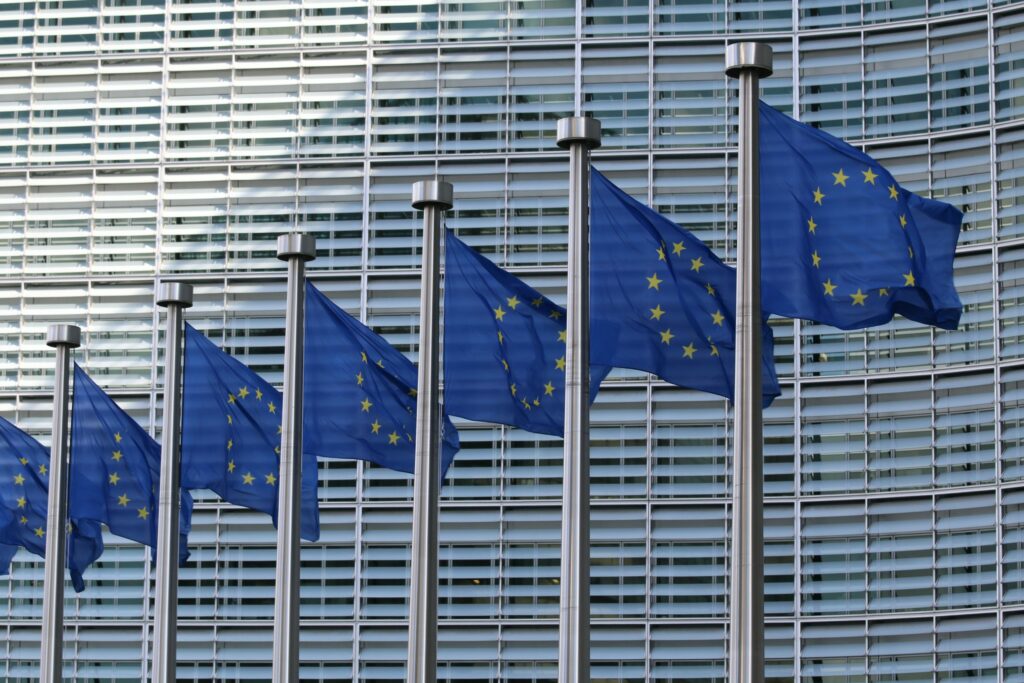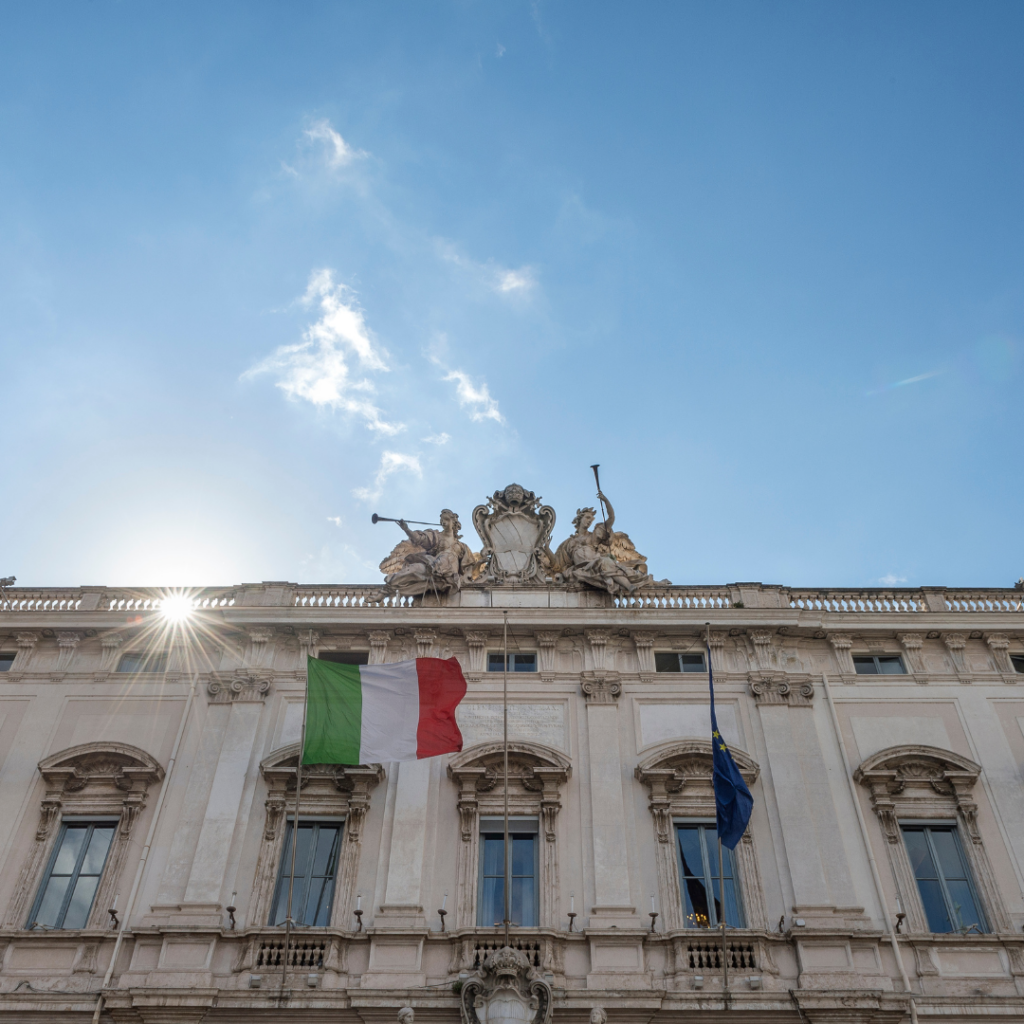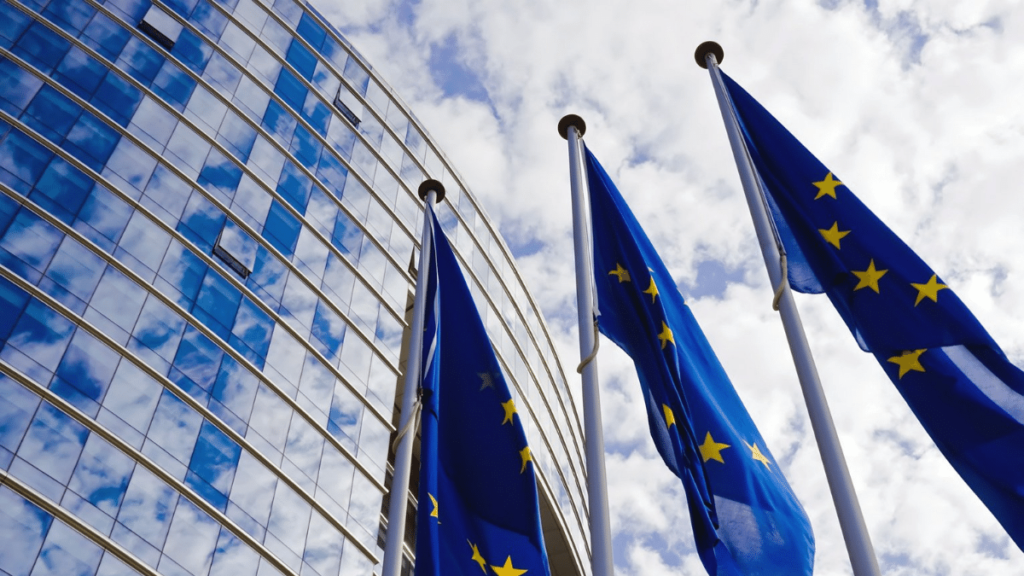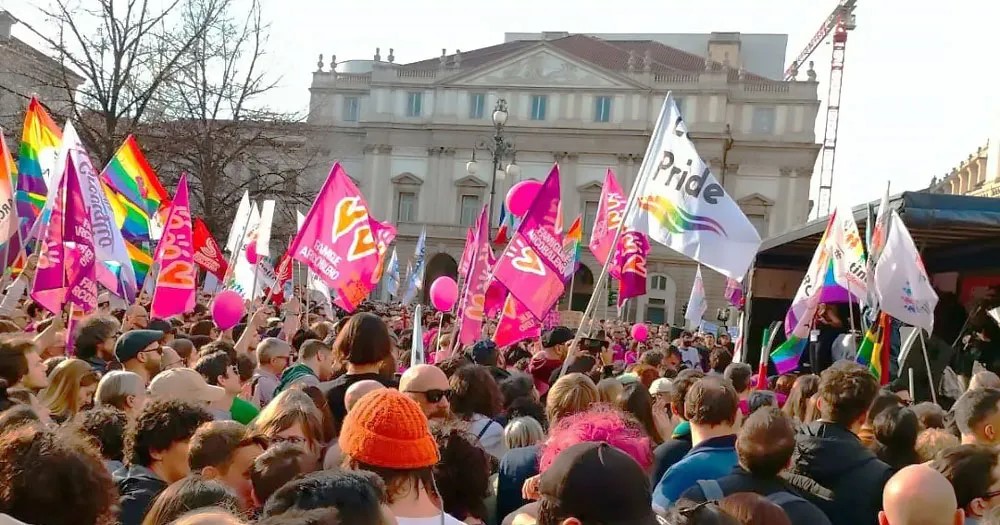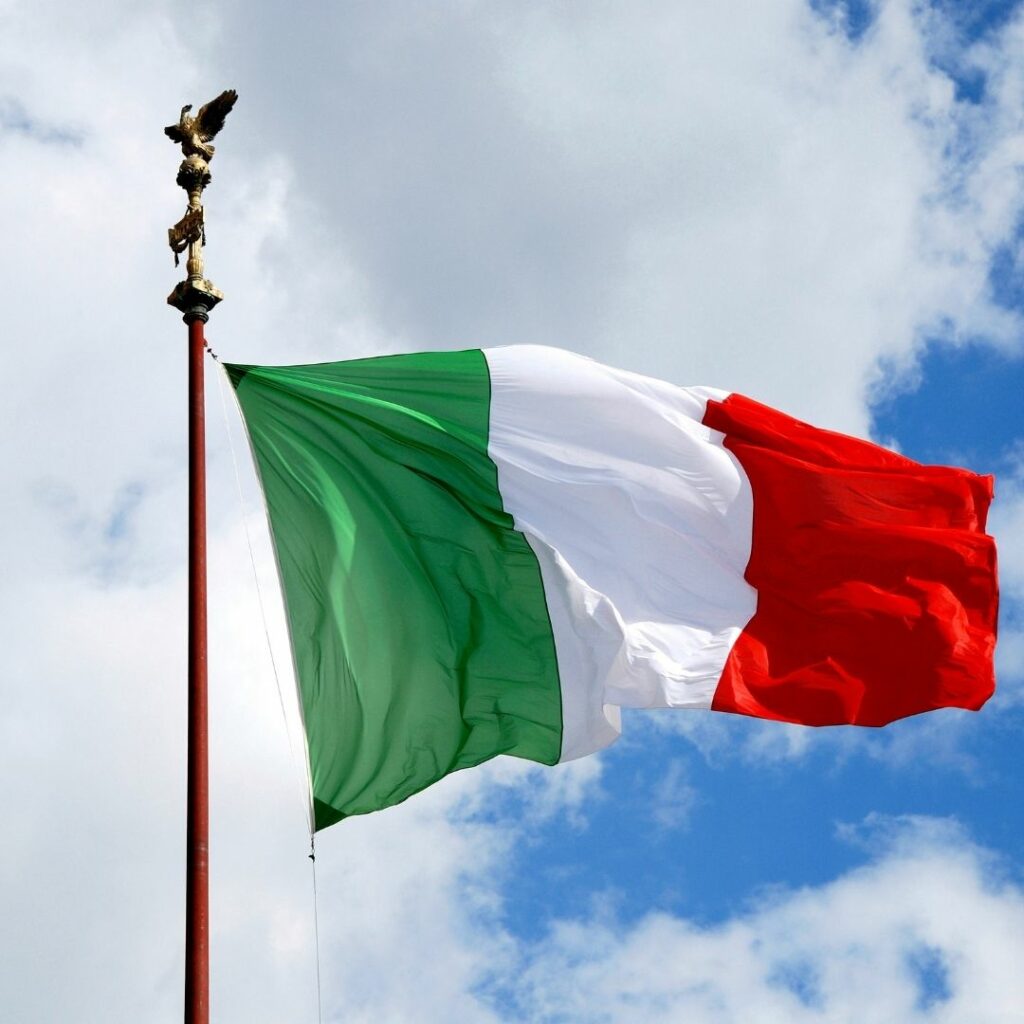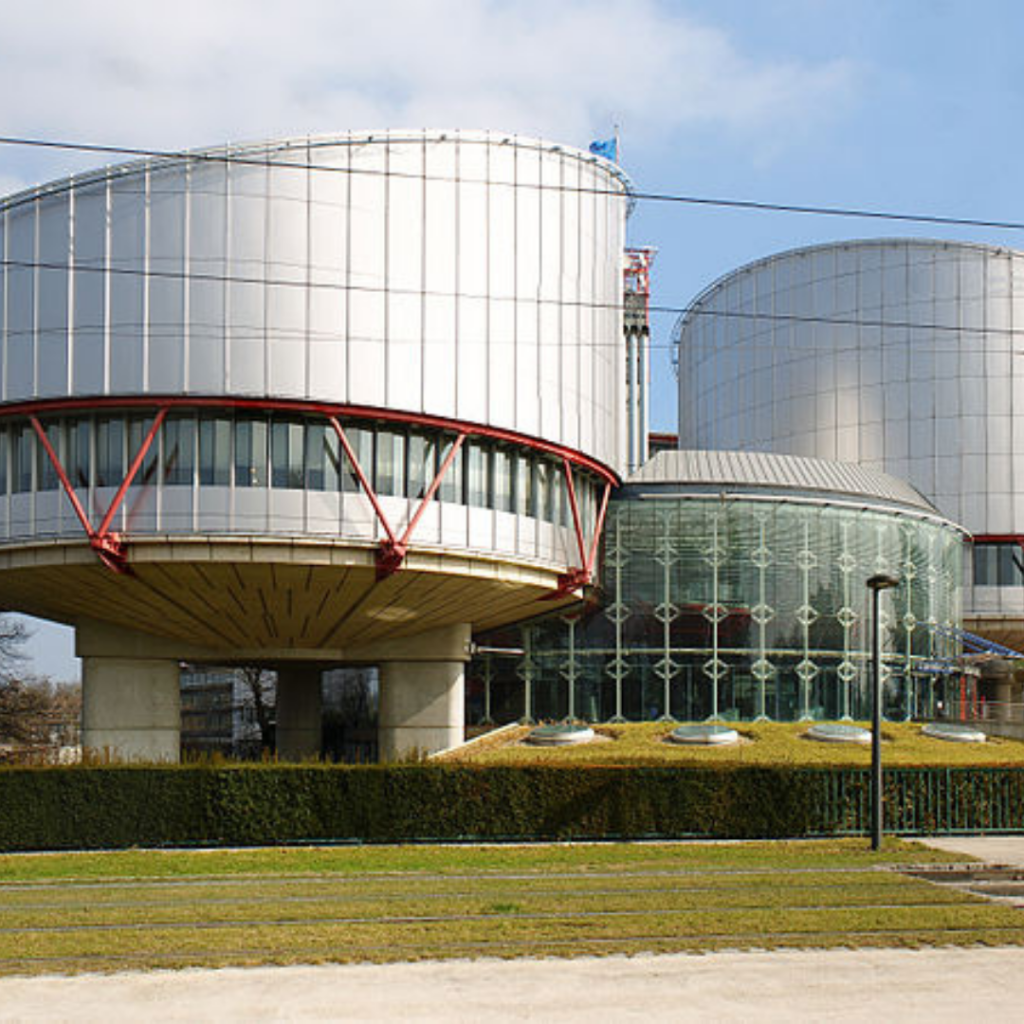Italy
Categories Score
The full bar chart stands for 100%, and is filled by the country category score. The colour display uses the traffic light palette, with Green representing a score closer to 100% and Red a score closer to 0%.
ASYLUM
This category looks into laws that expressly include SOGISC as a qualification criteria for seeking asylum. We also take into account other legislation, policies, instruction or positive measures by state actors that are related to asylum addressing the needs and rights of LGBTI asylum seekers and refugees.
Criteria Compliance Ratio
Each pie charts stands for a category and is divided in slices by criteria. When a country complies with a criteria – fully or in some regions – the slice is coloured.
Keep in mind the criteria have different weighting factor within a category; for example, the criteria Prohibition of medical intervention without informed consent (intersex) stands for half (2.5%) of the INTERSEX BODILY INTEGRITY category weighting factor (5%). Meaning that even if a country can only comply with this specific criteria within the category (1/4 total criteria) the category scores 50%.
More information on the categories and criteria weighting factors here.
Category & Criteria Table
The table lists detailed information and insights on legislation supporting each criterion status. Please use the filters for in-depth analysis.
n/a = not applicable, meaning the criteria didn’t exist in the previous Rainbow Map edition (PROGRESSION column)
- Complies
- Applicable in some regions only
- Does not Comply
RECOMMENDATIONS
In order to improve the legal and policy situation of LGBTI people in Italy, ILGA-Europe recommend:
- Adopting marriage equality and allowing for automatic co-parent recognition, so that children born to couples (regardless of the partners’ sexual orientation and/or gender identity) do not face any barriers in order to be recognized legally from birth to their parents.
- Prohibiting medical interventions on intersex minors when the intervention has no medical necessity and can be avoided or postponed until the person can provide informed consent.
- Depathologisation of trans identities.
Annual Review of Italy
In our Annual Review of the Human Rights Situation of LGBTI People in Europe and Central Asia, we examine the advances made and provide concrete examples of on-the-ground situations at national level country-by-country in the 12 months from January to December 2024.
Read our Annual Review of Italy below for more details and stories behind the Rainbow Map. You can also download the Annual Review chapter (.pdf) covering Italy.
-
In May, the list of “safe countries of origin,” which allows for an expedited and more restrictive asylum process, was updated to include four additional countries where homosexuality is criminalised: Bangladesh, Cameroon, Egypt, and Sri Lanka.
In October, with the approval of the new immigration decree, Cameroon and Nigeria were removed from the list of “safe countries”. This means that the current list of “safe countries” features nine countries that criminalise homosexuality, with no exceptions provided for at-risk groups such as LGBTI people: Bangladesh, Egypt, Sri Lanka, Tunisia, Algeria, Morocco, Senegal, Ghana, and The Gambia.
In October, a court in Bologna referred the question of the definition of ‘safe countries of origin’ to the European Court of Justice, requesting the Court to establish whether a country that is overall safe for its general population can be considered safe even if it perpetuates discrimination against specific minorities.
-
Italy’s Family Minister Eugenia Roccella criticised the declaration promoting European policies in favor of LGBT+ communities. She argued that the document’s advocacy for self-identification and fluidity in gender is an “ideological constraint” and a denial of the “inherent reality of biological sex.” Roccella emphasised her belief in maintaining “gender binarism,” asserting that there are only men and women.
During the Olympics, a hate campaign targeted Algerian boxer Imane Khelif, while some public figures and politicians attacked trans athlete Valentina Petrillo for her participation in the Paralympics.
In Milan, homophobic graffiti targeting a teacher appeared on the walls of a middle school five times in nine months.
In September, a teacher in Treviso was insulted by a student on grounds of his sexual orientation. Although the teacher filed a complaint against the pupil for insulting a public official, the court dismissed the case due to the fact that sexual orientation does not constitute protected grounds in hate speech legislation.
-
This year saw a troubling increase in the number and geographic spread of bias-motivated violence against LGBTI people in Italy compared to 2023, with incidents reported almost monthly.
In January, six youths were surrounded and beaten by a group of 12 people in Palermo, Italy, in a homophobic attack.
In March, two young men riding a scooter stopped, insulted and then assaulted another young man in Scampia, in the province of Naples. The two attackers shouted homophobic slurs at the victim before assaulting him.
In May, a 22-year-old man in Milan was attacked and stabbed for being gay. In Salero, Samir, a 32 year-old man of Honduran descent, was physically assaulted and was subjected to homophobic slurs.
In June, a gay couple was cornered and assaulted by three men and a woman in Rome after their attackers noticed they were holding hands. The attackers have since expressed remorse, claiming that the confrontation stemmed from a traffic dispute rather than discriminatory or homophobic motives.
In June, a makeup artist was attacked in Foggia, while, in Rome, two young men subjected an activist and leader of the Gay Party to insults before physically assaulting and threatening him.
In July, on Pride night in Cagliari, an individual was threatened with a knife, kicked, and punched in a homophobic attack, while during Naples Pride, two girls suffered head injuries as a result of an LGBTI-phobic assault.
In August, a boy walking with his partner in Turin was punched in the face by a group of strangers.
In August, two trans women were approached and attacked by a group of about ten young men in Castiglione in Teverina, in the Viterbo province. Despite the attack occurring in a busy square, none of the bystanders intervened to assist the victims or halt the violence.
In September, a 33-year-old gay man from Palermo, Sicily, took his own life, overwhelmed by the fear of being judged and discriminated against.
In September, a drag artist was attacked in Turin while walking arm-in-arm with his boyfriend, causing him to be taken to hospital.
In September, a 42-year-old man in Cremona was subjected to homophobic insults before being struck in the face with a can.
In November, Italian content creator Sespo reported being attacked while walking on the streets of Milan.
-
In May, a survey conducted by the universities of Verona and Pavia highlighted dissenting opinions on LGBTI rights across the Italian respondents. The survey revealed that 56.3% of Italians believe Parliament made a mistake by rejecting the Zan bill in 2021, the bill aimed to extend anti-discrimination protections to include sexual orientation, gender identity, and disability. The majority (59.7%) support simplifying the process for changing one’s gender marker on official documents. 83.4% agree with recognising unions between people of the same sex. Yet, there is a split on how this recognition should be implemented: 56.8% support extending marriage rights to same-sex couples, while 26.6% stated a preference for civil unions.
In July, the Italian National Institute of Statistics (ISTAT) published a book with their data on the ISTAT–UNAR project (2018-2023) concerning labour discrimination towards LGBTI individuals and diversity policy.
The results of a study on gynaecological health and LGBTI identities conducted by Coming-Out LGBTI+ Community Centre of Pavia and UNAR were published in September. The survey revealed a lack of adequate training on gender nonconforming identities and orientations, which precludes essential services to a substantial portion of the population.
-
In May, Laura Ravetto from the Lega Nord party introduced a bill aimed at banning the teaching of “gender theories” in schools.
In September, the Culture Committee of the Chamber of Deputies approved a resolution introduced by Rossano Sasso of the party Lega, calling on the government to exclude any content related to what is referred to as “gender ideology” in schools.
In October, the Undersecretary for Education, Rossano Sasso, requested the closure of a course at the University of Sassari on gender and queer theories. Undersecretary Sasso accused the University of Sassari of promoting “gender ideology” with public funds. The case also reached the Italian Parliament, leading to controversy.
In October, the association Provita e Famiglia and the political party Fratelli d’Italia criticised the University Aldo Moro of Bari, for hosting a conference on same-sex parenting, for allegedly denying children’s rights to both a mother and a father while promoting surrogacy. Provita e Famiglia also expressed outrage over the involvement of the university’s Rector, Stefano Bronzini, and the university’s counselling centre, which connects students with local LGBTI associations. Additionally, the association called on the Minister of University and Research, Anna Maria Bernini, to intervene and prevent Italian universities from using funds for political and ideological purposes.
-
In September, Italy’s Minister of University and Research, Anna Maria Bernini, requested an inquiry into whether a research project on trans and gender-creative children (ages 7–14) met the requirements of the public call won by one of the researchers at the University of Roma Tre earlier in 2024. The request came amidst a wave of hate speech and death threats targeting the two researchers—a cisgender woman at the University of Roma Tre and a non-binary person from the University of Bologna— sparked by certain political parties and anti-gender movements. The backlash extended to the researchers’ universities, with accusations of promoting “gender ideology” and demands for institutional action against them. In response, several associations and the Rector of the University of Roma Tre publicly defended academic freedom and condemned the attacks.
-
In January, a statement from the Ministry of Education addressing the Holocaust Remembrance Day failed to mention the persecution of LGBTI people.
In March, Italy voted against a European Commission regulation aimed at guaranteeing the cross-border recognition of same-sex parents.
In May, during the traditional spring assembly with Italian bishops, Pope Francis reiterated his stance against admitting gay men to seminaries. He reportedly expressed concerns about what he described as an inappropriate atmosphere within the Church, urging bishops to exclude LGBTI people from seminaries.
In June, the Puglia region enacted new legislation introducing structural measures to ensure equal rights for LGBTI people and address discrimination based on sexual orientation and gender identity.
In October, Senator Ivan Scalfarotto revisited the case of a prison police officer who faced discrimination in his workplace, the Vercelli prison. The officer was subjected to workplace discrimination by his colleagues and a prison inspector due to statements made by inmates about his perceived sexual orientation. After receiving such statements – which were later retracted – the inspector subjected the victim to a psychological evaluation and reported him to his superiors. While the Regional Administrative Court awarded the victim compensation, the issue remains unresolved, with the disciplinary proceeding against the inspector still pending and a parliamentary question being submitted by the Italia Viva Party on his qualifications and professional background.
-
The Court of Bergamo ruled against the National Institute for Social Services (INPS) for failing to allow same-parent families to apply for parental leave, citing this as an unjustified discrimination against same-sex parents. INPS was given two months to update its portal accordingly. However, instead of complying, the institute appealed the ruling and did not modify its IT system for handling administrative requests.
In February, the Court of Appeal of Milan ruled that only the biological mother can be recognised on the birth certificates of children of same-sex couples, obliging the non-biological parent to pursue adoption for legal recognition. Earlier, the court had invalidated the registration of a birth certificate for a child born to a male couple via surrogacy, deeming it illegitimate. However, this ruling established that even in cases where women use assisted reproduction, only the biological mother is entitled to be listed on the birth certificate. A few days later, the Court of Appeal of Brescia took a contrasting stance. In the ruling, the court upheld the validity of the birth certificate for a child with two mothers, arguing that an “evolutionary interpretation” of existing laws is necessary to address the gaps in legal protection for children.
In February, the Court of Appeal of Rome ruled against the Ministry of the Interior, who in 2019 put out a decree mandating the use of the terms ‘mother’ and ‘father’ on documents. The court ruled that electronic identity cards for minors should reflect the actual family structure by using “parents” or a similar inclusive term.
In March, the Padua court upheld the validity of birth certificates recognising children as having two mothers. In doing so, the court rejected a previous appeal from the Prosecutor’s Office that sought to erase the legal recognition of non-biological mothers or those who had not given birth. The decision emphasised that protecting the minors’ legal status and familial recognition takes precedence over the Prosecutor’s appeal.
In June, the Lucca court raised a constitutional question regarding articles 8 and 9 of Law 40/2004 and article 250 of the Civil Code, which currently limit legal parenthood status to the biological parent by excluding the non-biological mother from the birth records of children born through IVF. The deliberation was anticipated for early December 2024, but no official statements or rulings have been released to date.
In June, the Ministry of the Interior and the Venice Attorney General’s Office filed a complaint with the Venice Court of Appeal against the 39 decrees of the civil judges in Padua. In July, the Venice Court of Appeal “froze” the proceedings in Padua, pending the Constitutional Court’s decision on a similar case in Lucca.
In July, the Constitutional Court affirmed the status of de facto cohabitants as full family members, declaring Article 230-bis of the civil code unconstitutional.
-
In September, l’Espresso, a weekly news magazine in Italy, dismissed Simone Alliva, a journalist recognised (also) for his advocacy in LGBTI rights. Alliva alleged that he faced significant pressure, insults, threats, and verbal assaults before being dismissed.
-
In June, Italy refused to support an open letter produced by the United States and already signed by 37 diplomatic representations denouncing LGBTI discrimination in Hungary.
In November, in response to the state-sponsored dissolution of national organisations addressing LGBTI issues in Argentina, 30 Western ambassadors united under the “Diplomats for Diversity” initiative, signing a statement affirming their support for the LGBTI community. Notably, Italy’s Ambassador to Argentina, Fabrizio Lucentini, did not sign this appeal.
-
In May, a LGBTI co-housing refuge was established by the Gay Centre Association in Rome, marking the third LGBTI shelter in the capital. This refuge will accommodate up to three LGBTI youths who have experienced violence and discrimination.
In December, the National Network of LGBTQIA+ Anti- Discrimination Centre was officially established during the “Spazio ai Cad” initiative. The two-day event, held on December 7 and 8, took place at Cassero in Bologna as part of the La Violenza Illustrata Festival.
-
In March, the Commissioner for Human Rights of the Council of Europe released a report underscoring the trend of ultra- conservative governments exploiting LGBTI people to bolster their political standing under the guise of defending “traditional values.” The report urged governments and authorities, among them Italy, to develop and fund public awareness campaigns and training programs to better educate the public about the rights and experiences of LGBTI people.
In April, the European Parliament denounced the rise of anti- LGBTI rhetoric within some European governments, expressing concern about how such rhetoric undermines global efforts towards the universal decriminalisation of LGBTI identities.
In July, UNAR finally issued a call for the selection of projects aimed at establishing or strengthening centres against discrimination motivated by sexual orientation or gender identity.
In October, the Council of Europe expressed concern about the rise of hate speech and xenophobia in Italy, urging the government to adopt a plan to combat racism. After five years of monitoring the human rights situation in the country, the European Commission against Racism and Intolerance (ECRI) published a report highlighting an increase in xenophobic rhetoric in public discourse, particularly directed at refugees, immigrants, and LGBTI people.
-
The municipality of Turin introduced a policy allowing trans and non-binary people to use their chosen name on the GTT public transport card, aligning with their gender identity rather than their registered name.
In July, the Constitutional Court, answering the referral of a local court, ruled the request for legal gender recognition of non-binary people inadmissible but has called on Parliament to address the issue legislatively.
In July, the Constitutional Court declared unconstitutional the obligation imposed on trans people who want to undergo gender reassignment surgery to ask for authorisation from the court.
In August, Augusto Barbera, President of the Constitutional Court, reiterated that parliament should address the legal status of children of same-sex couples and recognise non-binary gender identities.
-
In November, the headquarters of the Mario Mieli Homosexual Culture Circle in Rome were vandalised with homophobic graffiti on its rainbow-coloured ramp. Lara Ghiglione, secretary of the CGIL, expressed dismay, stating that the attack confirmed once more the hostile climate in the country for LGBTI people.
In December, an LGBT+ Jubilee event organised by La Tenda di Gionata was removed from the Vatican’s official website without explanation. A Vatican official later clarified that its prior inclusion did not imply official support from the Holy See.
-
In April, Italy’s Prime Minister condemned surrogate parenthood as an “inhuman” practice. As part of her intervention, she also urged parliament to advance a bill that would criminalise Italians who travel abroad for surrogacy, which is already illegal in Italy and punishable by jail and fines.
In June, the Lega Nord party proposed an amendment to a bill that aims to prohibit surrogacy, even when conducted abroad. The bill proposed the introduction of imprisonment ranging from 4 to 10 years and fines between €600,000 and €2 million for those involved in surrogacy. In October, the bill was signed into law, allowing surrogacy to fall under the umbrella of “universal crimes”, a type of offence which typically applies to crimes like genocide or human trafficking, and extending penalties to Italian citizens who seek surrogacy abroad. The legislation, approved with 84 votes in favor and 58 against, ended up imposing fines ranging from €600,000 to €1 million and prison sentences from three months to two years. The law has sparked significant controversy, particularly among human rights groups, who argue that the law unfairly targets same-sex couples and infringes on personal freedoms.
The full Annual Review for 2025 is available here.

